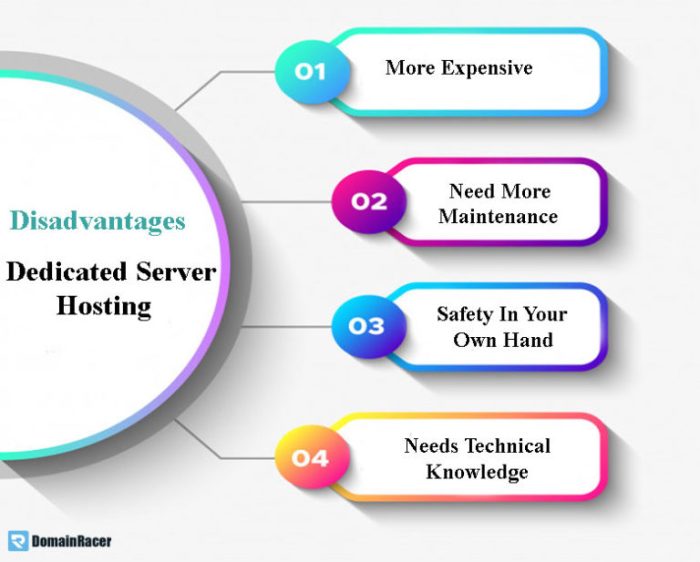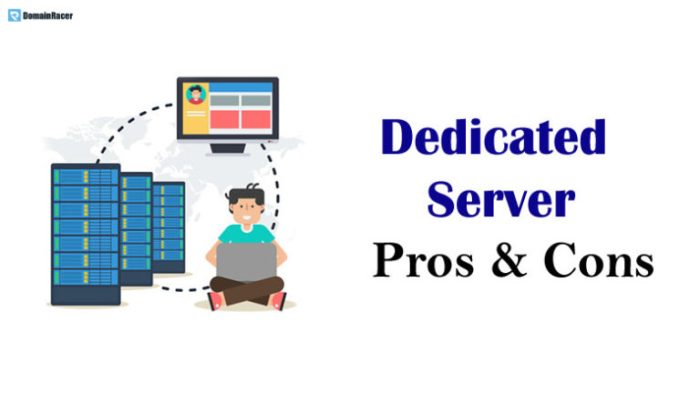Dedicated servers have long been the cornerstone of enterprise IT infrastructure, offering unparalleled control, performance, and security. However, it is crucial to acknowledge that dedicated servers also come with certain disadvantages that must be carefully considered before making an investment.
In this comprehensive guide, we will delve into the key disadvantages of dedicated servers, exploring their limitations and potential impact on your business.
From hardware constraints and high costs to security concerns and inflexibility, we will provide a detailed analysis of each disadvantage, empowering you with the knowledge necessary to make an informed decision about whether a dedicated server is the right choice for your specific requirements.
Hardware Limitations

Dedicated servers offer a dedicated physical server for exclusive use by a single customer, providing greater control and flexibility compared to shared hosting. However, this exclusivity comes with certain limitations, particularly regarding hardware resources.
Dedicated servers have finite hardware resources, including CPU, RAM, and storage. These resources are allocated to the server at the time of setup and cannot be easily upgraded or expanded without physically replacing the hardware. This can pose challenges in terms of performance and scalability, especially for applications that require significant computational power or large amounts of data storage.
CPU Limitations
The CPU is the central processing unit of the server and is responsible for executing instructions and calculations. Dedicated servers typically have a single CPU or a limited number of CPUs, which can become a bottleneck for applications that require high levels of processing power.
This can lead to slow performance, especially during peak usage times.
RAM Limitations
RAM (Random Access Memory) is used by the server to store data that is currently being processed. Dedicated servers have a fixed amount of RAM, which can limit the number of applications that can run simultaneously or the size of data that can be processed.
If the RAM is insufficient, the server may experience slow performance or even crashes.
Storage Limitations
Storage space is used to store the operating system, applications, and data on the server. Dedicated servers have a finite amount of storage space, which can limit the amount of data that can be stored. This can be a challenge for applications that generate large amounts of data or require extensive data storage.
High Cost of Ownership

Owning and maintaining a dedicated server incurs substantial costs, both upfront and ongoing. The initial investment includes hardware acquisition, setup, and configuration. Additionally, ongoing expenses involve server maintenance, software licensing, power consumption, and technical support.
Upfront Costs
The upfront costs of a dedicated server can be significant. Hardware costs vary depending on the server’s specifications, such as processing power, memory, storage capacity, and network connectivity. Installation and configuration services may also add to the initial investment.
Ongoing Costs
Maintaining a dedicated server incurs ongoing expenses. Server maintenance includes regular updates, security patches, and hardware replacements. Software licensing fees can be substantial, especially for enterprise-grade applications. Power consumption adds to operating costs, particularly for servers with high energy demands.
Technical support contracts provide access to expert assistance but can be an additional expense.Compared to other hosting options, dedicated servers have a higher cost of ownership. Shared hosting, where multiple websites share a single server, is a more cost-effective option for low-traffic websites.
Cloud computing offers flexibility and scalability, allowing users to pay only for the resources they use, but it may not be suitable for all applications.
Security Concerns
Managing a dedicated server comes with inherent security risks that demand robust measures to protect against potential vulnerabilities. Server owners bear the responsibility of ensuring data protection and adhering to security regulations.
Dedicated servers are vulnerable to cyberattacks such as unauthorized access, malware infections, and data breaches. Weak security practices, outdated software, and misconfigurations can provide entry points for malicious actors.
Server Owner’s Responsibilities
- Implementing firewalls, intrusion detection systems (IDS), and antivirus software to prevent unauthorized access and malicious activity.
- Regularly updating software and security patches to address vulnerabilities and minimize the risk of exploits.
- Enforcing strong password policies and two-factor authentication to prevent unauthorized login attempts.
- Monitoring server logs for suspicious activity and taking prompt action to mitigate potential threats.
- Backing up data regularly and implementing a disaster recovery plan to protect against data loss in case of a security breach.
Lack of Flexibility
Dedicated servers are less flexible than cloud computing services. With a dedicated server, you’re locked into a fixed amount of resources, such as CPU, memory, and storage. This can be a problem if your business needs change and you need to scale your resources up or down.
For example, if you experience a sudden increase in traffic, you may not be able to scale your dedicated server quickly enough to meet demand. This can lead to downtime and lost revenue.
Limited Scalability
Dedicated servers lack the scalability of cloud computing services. Cloud computing services allow you to scale your resources up or down as needed, so you can always have the right amount of resources for your business. This can be a major advantage, especially for businesses that experience fluctuating traffic or that are growing rapidly.
Technical Expertise Required

Managing a dedicated server demands a high level of technical proficiency. Administrators must possess a comprehensive understanding of server hardware, operating systems, networking, and security protocols. They should be well-versed in troubleshooting and maintenance tasks to ensure optimal performance and prevent downtime.
Specialized IT Personnel
For businesses lacking in-house IT expertise, outsourcing support to specialized IT personnel is advisable. These professionals can provide ongoing management, monitoring, and maintenance, freeing up internal resources to focus on core business activities.
Outsourced Support
Outsourcing server management to third-party providers offers several benefits. It allows businesses to access a pool of experienced IT professionals without the need for permanent hires. Outsourcing also provides access to specialized tools and technologies that may not be available in-house.
Conclusion
In conclusion, dedicated servers offer a range of benefits, but they also come with certain drawbacks that cannot be ignored. Hardware limitations, high costs, security concerns, lack of flexibility, and technical expertise requirements are all factors that must be carefully evaluated before making a decision.
By understanding these disadvantages, you can make an informed choice that aligns with your business needs and ensures optimal performance and security.
Frequently Asked Questions
Can dedicated servers be scaled easily?
Dedicated servers offer limited scalability compared to cloud computing services. Scaling resources up or down requires manual intervention and can be time-consuming, potentially impacting business continuity.
Are dedicated servers more secure than other hosting options?
While dedicated servers provide greater control over security, they also come with increased responsibility for data protection and compliance. Managing a dedicated server requires robust security measures and technical expertise to mitigate potential vulnerabilities.
Is a dedicated server always the best choice for businesses?
The suitability of a dedicated server depends on specific business requirements. For businesses with demanding performance needs, high security concerns, and the resources to manage a dedicated environment, it can be a viable option. However, for those seeking flexibility, scalability, and cost-effectiveness, other hosting options like shared hosting or cloud computing may be more appropriate.


